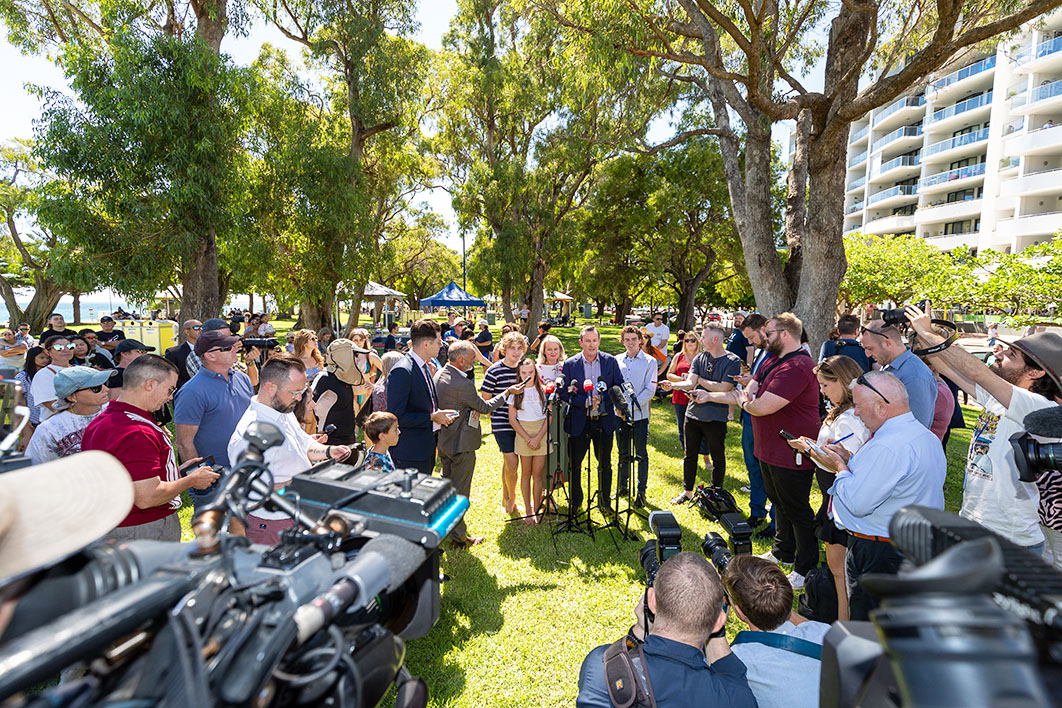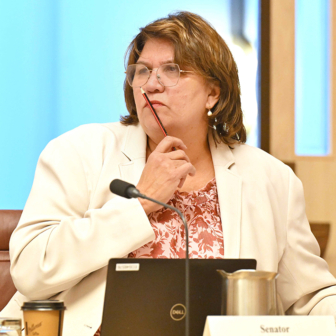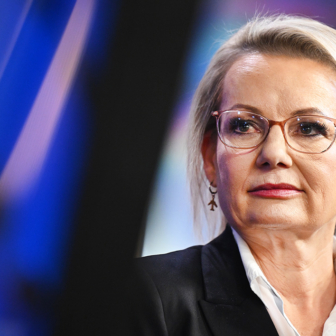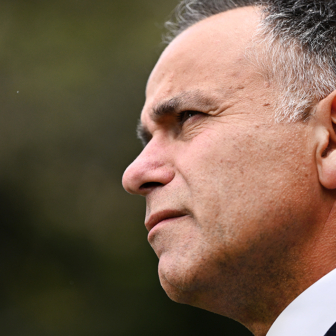The magnitude of Labor’s victory in Saturday’s WA election has sent observers scrambling for the record books. Incredibly, the combined swing to Labor at this and the previous state election is more than 25 per cent, meaning one in four voters has switched to Labor since it was trounced by Colin Barnett’s Coalition government back in 2013.
Led by the nation’s most popular premier, Mark McGowan, WA Labor has won at least fifty of the fifty-nine seats in the Legislative Assembly — ten more than its previously biggest-ever win in 2017 — and is favoured to win three more. The Nationals look to have won four (or at most five) seats while the Liberals languish on just two (with two others in doubt). Both are left struggling to achieve party status, with the Nationals leader, Mia Davies, the most likely candidate for opposition leader.
Opinion polls predicting a massive Labor win proved correct. The party received 59 per cent of the primary vote, up 17 per cent from 2017, and 69 per cent of the two-party-preferred vote. There have been other big wins in recent Australian political history — think Campbell Newman’s victory in Queensland in 2012 and Barry O’Farrell’s demolition of the NSW Labor government in 2011 — but McGowan’s share of seats (between 85 and 90 per cent) and two-party-preferred vote is higher, and didn’t involve turfing out an unpopular government.
To add icing to Labor’s cake, the party looks virtually certain to win an unprecedented Legislative Council majority in its own right. The state’s upper house has long been a conservative bastion, backed by significant rural vote weighting. But that was not enough to stop the McGowan juggernaut, with Labor likely to win twenty-two or even twenty-three of the Council’s thirty-six seats. One casualty is the Greens, who might be reduced to just one seat (down from four). Labor’s majority should enable it to pass its legislative program unchallenged, and give it the opportunity to end electoral malapportionment and reform the current system of above-the-line group ticket voting.
Labor’s re-election was regarded as a foregone conclusion — two terms is normal for WA governments — but its strong handling of Covid-19, combined with the state’s traditional independent-mindedness (or parochialism, depending on your point of view), a soaring iron ore price, and buoyant state finances all helped boost McGowan’s popularity.
Added to that was the Liberal Party’s woeful performance. Having cycled through four leaders in as many years, it achieved another record of sorts on Saturday when its new leader, the thirty-four-year-old Zak Kirkup, lost his own seat — the first time this has happened to a leader of a major party in eighty-eight years. With a primary vote of just 21 per cent, the party also lost former leader Liza Harvey’s seat, and several formerly rock-solid Liberal electorates in Perth’s affluent riverside and coastal areas.
Although Kirkup has been energetic and articulate since becoming leader in November, the Liberal campaign was unusual, to say the least, and failed to put any significant pressure on the government. In fact, the Liberals somehow managed to make themselves the focus of most of the campaign, rather than targeting areas where Labor might be vulnerable.
The Liberal campaign commenced with the surprise announcement of an ambitious green energy policy. This might have wrong-footed the government but it also jolted many Liberal candidates and traditional supporters. It was soon overshadowed by Kirkup’s effectively conceding defeat almost three weeks from the election, shifting the party’s message to warning about the dangers of Labor’s winning “total control” and urging people to keep the government accountable. This attempt to shore up the Liberal base looks to have failed completely. Other problems included the controversial views of several candidates; Kirkup’s admission that he wouldn’t return to politics if he lost his own seat; and a shambolic press conference on the party’s election costings just before polling day.
By contrast, Labor rolled out a steady stream of relatively low-key election promises focused mainly on jobs and economic diversification, and centred its campaign on McGowan’s leadership and the contrast with the Liberals’ neophyte leader.
The result leaves both parties with plenty to think about. With three cabinet members and the speaker having retired, Labor has openings for new ministerial talent, though keeping the expanded backbench occupied and satisfied will require deft management. Winning control of the Legislative Council will remove any excuse for failing to tackle thorny legislative issues, including updated Aboriginal heritage laws and tougher campaign financing laws. The need to deliver on the expanded Metronet suburban rail network and other big-ticket items, and to ease pressure on social housing and public hospitals will also be priorities. Finally, given the parlous state of parliamentary opposition, the premier will need to resist signs of arrogance or overreach.
For its part, the Liberal Party must undertake some deep soul-searching. The influence on candidate preselections of factional powerbrokers with links to conservative churches has been a turn-off for many traditional party backers in business and the broader community. A lack of parliamentary resourcing will also put a strain on the party’s ability to regroup and be competitive at the 2025 election, let alone to assist its federal counterparts in the election due by mid 2022.
With eleven Liberal members currently sitting in the House of Representatives, and just five Labor members, Western Australia is important to Scott Morrison’s plans to retain power at the next federal election. While direct crossovers between state and federal elections are rare, those that do exist are primarily negative for the Liberals. The federal government’s initial intervention in support of Clive Palmer’s High Court case against the state’s border closures gave WA Labor a free kick in 2020; a resurgent Labor and a dispirited Liberal organisation will not make things any easier for the prime minister in 2021. •




